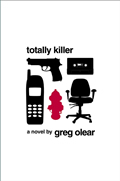
Readers of my novel
Totally Killer ? which "drops" this week ? often ask me the same question. "Greg," they say, "your voice is so original, so unique, such a breath of fresh air... I was just curious... who are your major influences?"
OK, fine, no one has said that. And they certainly haven't formulated it in quite that way (although I did get some flattering blurbs). But in case some astute reader does pose the question on my book tour, I have taken it upon myself to prepare a response.
Now, in answering such a loaded question, it is stylish for a debut novelist with literary pretensions ? someone like, you know, Greg Olear ? to invoke names like Dickens, Dostoyevsky, Tolstoy, Faulkner, and maybe Jane Austen if he doesn't want to convey the impression that his personal canon consists entirely of dead white guys.
Fortunately for you, Dear Reader, none of the aforementioned luminaries held much sway over Yours Truly. Nor were the Cliff's Notes to Bleak House and Anna Karenina particularly inspiring. (Though, I did learn a lot about 19th-century advances in farming techniques from the latter, from which my vegetable garden has greatly benefited.)
I prefer Hardy to Dickens, Percy to Faulkner, Nabokov to other Russians, and Brontë to Austen (mostly because I get to put the cool accent over the e). But my major influences include Salinger, Hemingway, Fitzgerald, and?
Hold on a sec. I have a better idea.
Rather than rattle off a laundry list of canonized novelists everybody likes, with contemporaries like Paul Theroux, James Ellroy, and Claire Messud sprinkled in for flavor ? the last thing I want to do in this space is cut and paste my Facebook "15 Books That Influenced You" note ? let's shake it up a little. Let's spend the next five days discussing five unusual influences ? those not usually associated with writing literary fiction.
I mean, when Ian McEwan says that John Updike and Saul Bellow were important to his work, you sort of nod and say, Well, of course. But even a novelist of McEwan's sublimity ? Atonement is the best English-language novel written in the last 25 years, it says here ? had to have been influenced by less obvious works. Right?
This quintet ? a piece of speculative fiction, a parodist, a magazine, an operetta, a humor book ? honed my sensibilities as a writer in my formative years. Without their collective influence, I probably would have eschewed writing novels for a more lucrative career, like practicing law or painting houses. And I certainly would not have "managed to channel the irreverent ghost of Hunter Thompson, doused it with Flannery O'Connor's DNA, piped in the dark, smart, unsettling humor of some long lost kid brother to the late giant, David Foster Wallace, and from this unlikely mix gifted the planet with [my] own unique, riveting, Voice of a Generation-ish debut novel," in the words of the great Jerry Stahl.
(Sorry, had to get that in there. Jerry, if you're out there: Pain Killers is terrific, and your check is in the mail.)
(And while we're doing parentheticals, remember what I said about the Cliff's Notes? I was joking. I really did read Anna Karenina. And on my own, no less; not for some class. A fine novel... but the end was a train wreck.)
Before we get to the five, I'd like to thank Powell's for graciously providing me the space to post this. Please support independent bookstores, tip your waitress, and drive safely.
And now, on to the list, which I present in chronological order...
Unlikely Influence #1: 1984
I read 1984 in 1984, when I was 11 years old.
Around the same time, my English class ? a handful of geeks they plied with difficult vocabulary quizzes to keep quiet ? was working on Norton Juster's The Phantom Tollbooth, and I had just finished with John Christopher's Tripod trilogy ? The White Mountains, The City of Gold and Lead, and The Pool of Fire.
All four were terrific YA novels, but they were just that ? YA novels. (Sidenote: Why have they not made a Tripods movie? Or have they, and it was so lousy it's not even listed on IMDB?)
The point is, 1984 was the first adult novel I ever read ? an odd choice, to be sure ? and as such, it had a profound effect on me. Big Brother, Newspeak, Two Minutes Hate, the Ministry of Love, War is Peace ? all of it was branded on my young and impressionable mind, which spent more time contemplating the goings-on in Room 101 than 11-year-old gray matter probably should. But it all stuck with me. I didn't know from Stalin or Soviet ideology or any of the actual targets of Orwell's satire; for me, the book stood on its own merits.
But it was deeper than that.
That Orwell has the same initials I do ? further, that his name is almost an anagram of my own ? I took to be a sign. An invitation, really. Here was a kindred spirit, I reckoned, someone like me (even if, of course, he wasn't really like me at all). If I took off my glasses and looked at 1984 on my bookshelf, I saw not George Orwell but Greg Olear. And I thought: that's what I want to do.
There is no indication in Totally Killer ? or any of my extant work, really ? that Orwell meant so much to me. Yet if my author influences were the presidents of the United States, he would be another George ? Washington: the first, the precedent, and if not the best, certainly the most important.
Tomorrow: Unlikely Influence #2: The Court Jester of the King of Pop